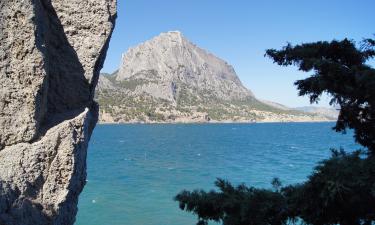New Foreign Minister's first press conference
After Sergei Lavrov was appointed foreign minister, Russian analysts wrote there would be no major changes in Russia's foreign policy, while the work of Russia's Security Council should be watched closely because it is now headed by ex-foreign minister Igor Ivanov. This forecast was proved perfectly correct during the first press conference of Sergei Lavrov, who moved into his new office this week.
"I see no need to amend the strategic elements of the concept of Russia's foreign policy," he said, recalling Vladimir Putin's recent statement: "We shall try to guarantee Russia's national interests without reverting to confrontation or aggression."
Lavrov also said, "It is encouraging that Igor Ivanov has been appointed Secretary of the Security Council, which is designed to co-ordinate the work of all departments responsible for national security." The minister expressed the hope that the Security Council will become more effective under Igor Ivanov.
Sergei Lavrov, who spent a lifetime in New York, is well versed in international politics and the intricacies of Russia's position on a variety of issues. He clearly answered questions about Russia's relations with the EU and the USA, the Cyprus and Karabakh settlements, the situation in Kosovo and Bosnia, co-operation with Iran, etc.
The triumphant Moscow debut of Russia's new foreign minister can be attributed to Lavrov's service at the UN, where he represented Russia for ten years, from 1994 to 2004. However, some say he worked there for 17 years, since in 1981-1988 he was first secretary, counsellor and then senior counsellor in the Soviet Union's permanent mission at the UN. By studying "the world as it is" at the UN, he has a thorough knowledge of virtually every international problem.
One consequence of this is the word "we," which the minister sometimes uses. When he says it, he usually means "we the international community" or "we the UN Security Council." Another and far more serious result of that experience is Lavrov's conceptual view of modern developments. In his words, the new world system is still under construction. The mechanisms that prevented many conflicts in the past became ineffective after the end of the Cold War, thereby giving rise to new crises to which the world is straining to find a common answer. Taken together, this forces the world community to search for new solutions in the dark and on the move. The main thing is to do this collectively rather than unilaterally.
The new minister mostly replied to questions in a calm and easy manner. Take the answer to a question about the right to pursue and eliminate terrorists beyond national territory. "This is not a question to Russia," said Lavrov. "We should better recall the actions of Israel and what has been done to the Taliban, al-Qaeda and the Iraqi regime." The minister pointed out that there were many difficulties today, but said this was not a reason to avoid facing problems or giving answers to questions that affect Moscow's legitimate answers.
Sergei Lavrov is a globally respected diplomat, which his first confident actions as the new foreign minister of Russia show convincingly. He is perfectly suited to the image of new Russia, a country that has emerged stronger from the crisis of the 1990s and whose role on the world scene will continue to grow.
Subscribe to Pravda.Ru Telegram channel, Facebook, RSS!





